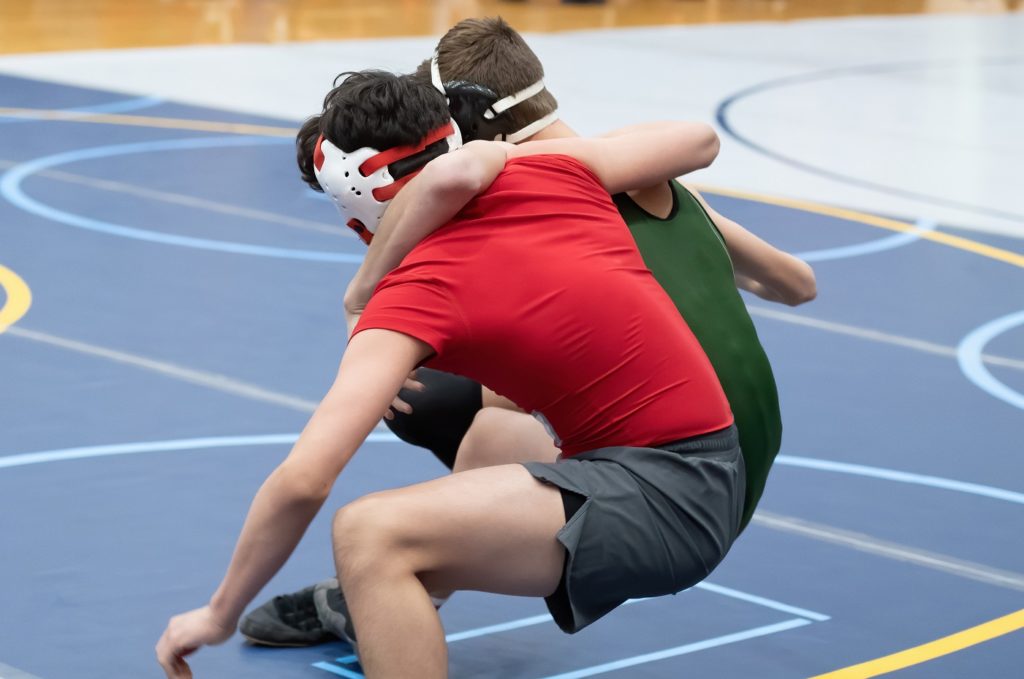I lie awake at 5:00 am, waiting as long as I can before painfully peeling myself out of bed. I hang a pulley contraption from the top of my dorm room door, with a loop for my head. I gently pull another dangling rope to raise my head away from my shoulders, which instantly relieves the bulging disc between my C6 and C7 vertebrae. I breathe. Thirty seconds of traction, ten seconds off. I can think again for thirty seconds at a time.
I think about how I could have avoided this: when I grasped his leg I should have switched to an outside finish rather than trying to drive straight through. Instinctively I shift in my chair to mimic the motion—pang—and I cringe as needles carve behind my right ear. Sit still. At the time of impact, it had felt like just a minor tweak; wrestling practice was over anyway, so I figured I could sleep it off. That was a mistake.
During my next half-minute, I consider my schedule for the day. I can fit in an extra hour of reading this morning. Then, if I sit up straight and don’t turn my head during class, I can survive my three-hour Value Theory seminar. I’ll look awkward but alert—an apt description of most Princeton students. After that, I’ll trek to therapy.
I relax the rope, readjust my grip, and pull again. I consider the strangeness of my combined academic and athletic life. Isn’t the jock supposed to be the antithesis of the nerd? Television shows portray these types as mutually exclusive: the one usually stuffs the other into a locker. Isn’t the stereotype of the wrestler—a sadistic meathead—incompatible with the philosopher—a thoughtful seeker of truth? Why did I feel like wrestling and philosophy were the perfect pairing?
Start your day with Public Discourse
Sign up and get our daily essays sent straight to your inbox.
An Ancient Connection
I soon discovered that I was not the first to make this association. In Ancient Greece, wrestling was the most widely practiced sport, where competitors sought to throw, pin, push out, or submit their opponents. The sport resembled modern-day Greco-Roman wrestling, plus submission holds. Plato’s akedemia, a garden and gymnasium on the outskirts of Athens, was known as a hub for wrestling and intellectual discussion. Plato himself was not just a philosopher but also a wrestler, and a good one at that: he competed in the Isthmian Games, a competition comparable to the Olympics. In fact, “Plato” was a wrestling nickname, meaning broad-shouldered. Between his lectures in the original academy, Plato likely sparred with his pupils and practiced throwing techniques. His famous mentor, Socrates, was what we might call a “volunteer coach.” Plato records many of the Socratic dialogues as taking place at the edge of the ancient wrestling mat where Socrates philosophized with young men. Socrates was a regular at the Lyceum gymnasium where, decades later, Aristotle started his own philosophical school.
I slowly release the rope and re-stack my spinal column. I hear my teammates’ alarms go off for morning lift. We were up late last night debating God’s existence. Although my two teammates are not philosophy majors, they are surprisingly good philosophers; both can comfortably talk through abstract arguments on sensitive topics. In fact, I find that the best wrestling partners are often the best interlocutors. I can try moves with them because they provide exactly the right amount of resistance. Too much resistance, and I could not genuinely attempt a new move for fear of getting hurt. Too little resistance, and I would not be able to tell whether the move had been truly successful.
Ancient philosophers recognized this parallel between wrestling and philosophy. They saw wrestling as a physical dialectic, a physical manifestation of philosophical argument. Plato framed several Socratic dialogues as if they were wrestling matches, some friendly, some hostile. In the Theaetetus, Socrates prods a young boy: “try a fall with me and we shall both be the better.” Plato and Socrates characterized leading interlocutors into contradictions as “pinning them down.” This “pinning” was not solely for one’s own glory, for it meant that an opponent would not fall for that move again. It would force him to improve his argument. In both philosophy and wrestling, an opponent’s cooperation and resistance are vital to one’s own growth.
The Virtues of Wrestling and Philosophy
As my teammates leave, they laugh at my pathetic situation—my pulley system and my red face—and I motionlessly laugh back. I find it a relief to laugh at myself. Thankfully, wrestling has prepared me for humiliation. Since the age of four, I have regularly walked half-naked onto a wrestling mat in front of my friends and family, only to be physically beaten by another person. Sometimes the physical and emotional pain proved too much, and I cried. Nevertheless, I would shake my opponent’s hand and try again. I was forced to be courageous, to wrestle despite the risk of utter embarrassment. This process naturally encouraged discipline and self-control because I didn’t want to be embarrassed. I needed to train harder, to push myself past my bodily limits, and I needed to temper my eating and drinking in order to wrestle at the right weight class.
Although philosophical discussion lacks these physical aspects, it requires similar virtues. It takes courage to put one’s own beliefs “half-naked” into the arena. One must be prepared to lose honorably, and to be honest about whether an argument has withstood the barrage of blows. And one must have discipline to study and understand the arguments in play.
It was no surprise to the ancient philosophers that athletics cultivated virtue. Plato called athletic training a “helper for philosophy,” and claimed that too much “emphasis on athletics produces an excessively uncivilized type, while a purely literary training leaves men indecently soft.” When athletic training is separated from intellectual education, it is predictable that the “excessively uncivilized” will stuff the “indecently soft” into lockers, and that the “indecently soft” will seek to undermine the power of the “excessively uncivilized.” (I wonder if these categories accurately describe the extremes of modern political dialogue.) The combination of philosophy and athletics best equips young men and women with the virtues required to discover and contemplate truth.
How strange, then, that the modern academy has shifted away from both philosophy and athletics. Wrestling is the most cut athletic program of the last fifty years, and recently there have been several well-known philosophy department eliminations. The original elements of the akademia have become inessential to the university. What does this say about contemporary academia?
The combination of philosophy and athletics best equips young men and women with the virtues required to discover and contemplate truth.
Wrestling and Philosophy are Intrinsically Good
Oblivious to this problem, I gently pull the dangling rope once more. I consider how wrestling and philosophy are similar in another way: neither is primarily practical. One does not wrestle just to acquire self-defense skills or make millions in MMA. Likewise, one does not philosophize just to ace the LSAT or become persuasive. Wrestling and philosophy are intrinsically good. Even if the competition and camaraderie found in wrestling yield no external benefits, it is still good to wrestle. Even if discovering deep and fascinating truths (and the connections between those truths) yields no external benefit, it is still good to discover them. The wrestler and the philosopher do not accomplish their objectives when they ascend the podium or accept an award. They receive their true rewards in the acts themselves: in defeating opponents and in contemplating truth.
Aristotle thought that contemplation was man’s highest activity, and that the virtues developed in other aspects of life prepared one for this activity. Indeed, wrestling prepared me for the contemplation of truth. And, thankfully, I did not need a perfectly intact spine to do so. I could sit here hanging myself and continue to wrestle with ideas. If Plato was right in thinking that the mind cannot die, then perhaps I will continue to wrestle forever.













